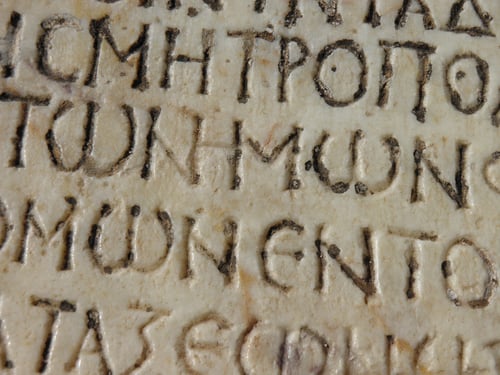
The Ancient Greeks are known for their contributions to modern society. The Greeks are often thought of as the founders of philosophy, as well as early pioneers in literature, government, and more. The Greeks were also one of the first to develop a comprehensive, written language that surfaced around the 8th century B.C, and was used widely across the region.
Though the ancient Greek alphabet originally had multiple variants, The Euclidean Alphabet, which is still used today, has been used since the 4th century B.C. In addition to being used in the Greek language, Greek letters are also used as symbols in math and science, as well as in other fields. Below, we will go over the Greek letters as they’re used today, modern pronunciation, and their approximate English equivalents.
A Brief History of the Greek Alphabet
The Greek language was adapted from the earlier Phoenician and Semitic alphabet. Initially, the Greek alphabet used all the symbols from the Phoenician alphabet and adapted some to denote vowel sounds. The Greeks added and dropped letters over time and changed their sounds and meaning.
At first, the language used the same alphabet was pronunciations, and therefore dialects, differed by region, being separated into Southern, Western, Eastern, and Classic. The Southern dialect was most similar to the ancient Phoenician.
The way the letters were written were adapted over time as well. Originally, there were no uppercase letters. These were added in the late ninth century. They also changed what the letters were called to match the changing pronunciation. In this way, the Greek alphabet is very phonetic, and you can see these phonetic influences in other languages across the globe.
The same Greek alphabet is still used today, with some modifications in the letters and pronunciations.
Other Uses for Greek Alphabet Symbols
While you may not use the Greek alphabet symbols in your own language, you may recognize some of the letters from math, science, and other labeling. There are just a few common examples of where you might see Greek letters
A common example is the Greek letter Pi, which is a mathematical constant and is used as the ratio of a circle’s circumference to its radius. Pi is commonly shortened to “3.14”
Greek letters are also used in astronomy, to identify stars within a constellation. The biggest star in a constellation would be referred to as the Alpha, and the second biggest star as the beta and so forth.
Greek alphabet letters are also used in computer science and is an important part of some coding methods, such as Unicode.
Greek letters are also used often on college campuses by fraternities and sororities, and the organizations are often referred to collectively as “Greek Life” because they have adopted the alphabet as a naming technique, originally as a way to keep their organization a secret from non-members.

The Greek Alphabet
Now that you recognize where and how you’ve encountered Greek alphabet symbols, we can go over which Greek letters are which, and how to identify and pronounce them.
Chart 1: Greek Alphabet Letters and Their English Equivalents
Of course, the English equivalents are not exact, but are the closest we could find. If you go ahead and start learning Greek, you’ll find that some sounds are more frequent than others, and the pronunciations in some cases are slightly different than what we’ve outlined below.
| Greek Uppercase Letters | Greek Lowercase Letters | Greek Letter Name | English Equivalent (Modern approximate) |
| Α | α | Alpha (Alfa) | A |
| Β | β | Beta (Veeta) | V |
| Γ | γ | Gamme (Yamma) | Y |
| Δ | δ | Delta (Thel-ta) | D |
| Ε | ε | Epsilon (Epsilon) | E |
| Ζ | ζ | Zeta (Zee-ta) | Z |
| Η | η | Eta (Ee-ta) | I |
| Θ | θ | Theta (Thee-ta) | Th |
| Ι | ι | Iota (Yo-ta) | I |
| Κ | κ | Kappa (Kah-pa) | K |
| Λ | λ | Lamda (Lahm-tha) | L |
| Μ | μ | Mu (Mee) | M |
| Ν | ν | Nu (Nee) | N |
| Ξ | ξ | Xi (Ksee) | X |
| Ο | ο | Omicron (Oh-mee-cron) | O |
| Π | π | Pi (Pee) | P |
| Ρ | ρ | Rho (Ro) | R |
| Σ | σ | Sigma (Siy-ma) | S |
| Τ | τ | Tau (Tahf) | T |
| Υ | υ | Upsilon (Eepsilon) | I (ee) |
| Φ | φ | Phi (Fee) | F |
| Χ | χ | Chi (Hee) | Ch |
| Ψ | ψ | Psi (Psee) | Ps |
| Ω | ω | Omega (Omay-ya) | O |
Chart 2: Greek Alphabet Letters With Modern and Ancient Pronunciations
Keep in mind that these pronunciations are the closest we could find to English, but are not exact.
| Greek Letter | Letter Name | Ancient Pronunciation | Modern Pronunciation |
| Α α | Alpha | A like in Acorn | A like in fAther |
| Β β | Beta | B like in Boat | V like in Vet |
| Γ γ | Gamma | G like in Gem | Y like in Yes |
| Δ δ | Delta | D like in Door | Th like in Those |
| Ε ε | Epsilon | E as in Excellent | E like in Excellent |
| Ζ ζ | Zeta | Sd like in wiSDom | Z like in Zoo |
| Η η | Eta | A like in trAIn | I like in taxI |
| Θ ο |
Theta |
T like in Ten | Th like in THem |
| Ι ι | Iota | I as in machIne | Y like in Yodel |
| Κ κ | Kappa | K like in marK | K like in marK |
| Λ λ | Lamda | L like in Large | L like in Large |
| Μ μ | Mu | M like in Modern | M like in Modern |
| Ν ν | Nu | N like in Never | N like in Never |
| Ξ ξ | Xi | X like in neXt | X like in neXt |
| Ο ο | Omicron | O like in sOft | O like in sOft |
| Π π | Pi | P like in Pop | P like in Pop |
| Ρ ρ | Rho | Trilled/rolled R like in Spanish peRRo | Trilled/roller R like in Spanish peRRO |
| Σ σ | Sigma | S like in Soft | S like in muSic |
| Τ τ | Tau | T like in Teach | T like in Teach |
| Υ υ | Upsilon | U like in rUse | I like in machIne |
| Φ φ | Phi | P like in Pool | F like in Fan |
| Χ χ | Chi | C like in Cat | Ch like in loCHness |
| Ψ ψ | Psi | Ps like in laPSe | Ps like in laPSe |
| Ωω | Omega | Aw like in clAW | O like in sOft |

The Greek alphabet has been a significant part of historical events and major contributions to the arts and humanities. Even Greek mythology is a major part of our collective consciousness, and the alphabet was the beginning of these major achievements. Knowing the Greek alphabet can help you gain a better understanding of Greek classics, as well as provide knowledge and reference in science and math where it requires you to know the Greek alphabet. Even if you don’t plan on becoming fluent, it’s definitely worth knowing.
What's Next?
Curious about Greek mythology? Start with Zeus, the King of the Greek gods.
Interested in learning the basics of more languages? Check out our guides on How to Say Good Morning in Japanese and French, Spanish Body Parts and Love Quotes, and Thank You in German.
For math and science subjects where you'll probably encounter Greek letters, read all about dynamic equilibrium, trig identities, and STEM careers.









